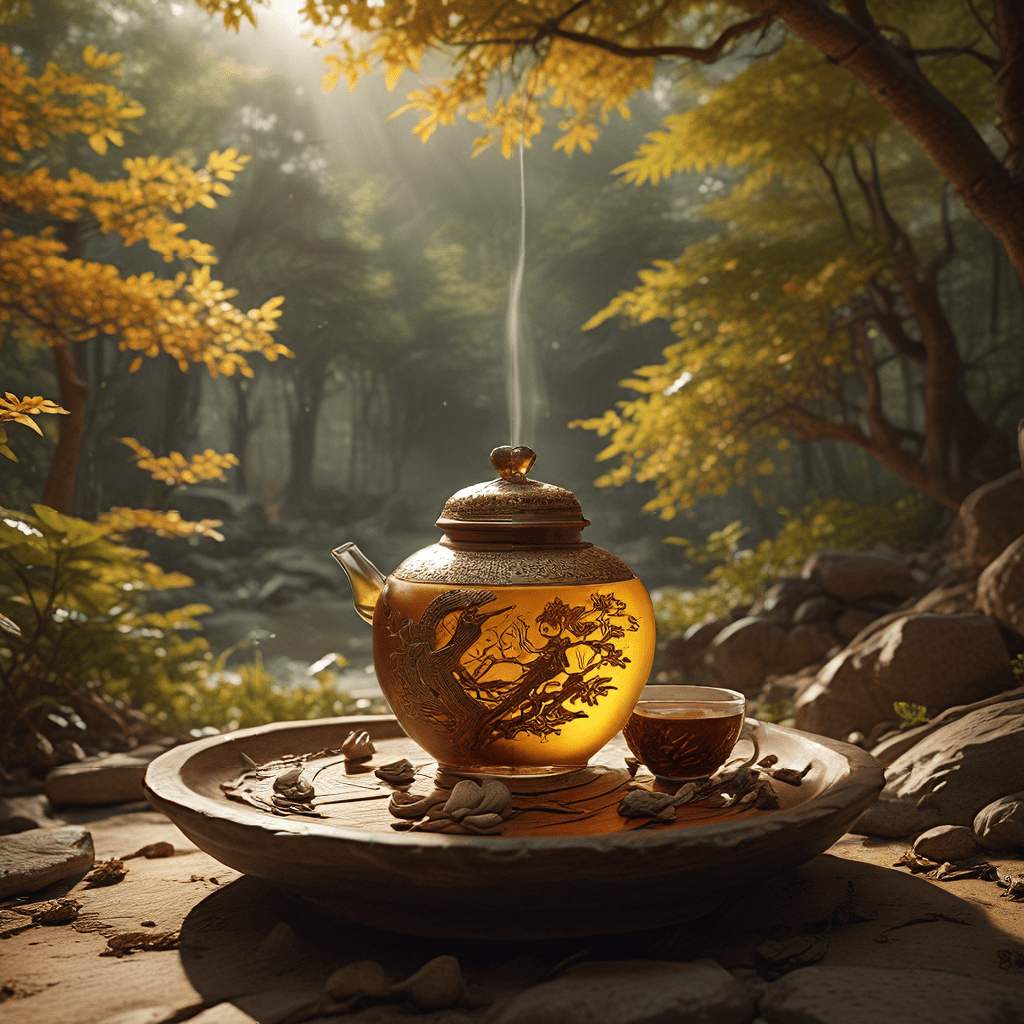The Legend of Ssanghwa Tea: A Korean Elixir of Immortality
In the heart of Korean folklore lies a legendary elixir known as Ssanghwa Tea, a mythical brew said to possess extraordinary life-extending powers. This mythical tea is inextricably linked to the revered ginseng root, a symbol of longevity and vitality in Korean culture. Ssanghwa Tea, often depicted as a royal concoction consumed by emperors and noblemen, holds a captivating place in Korean mythology. The tale of Ssanghwa Tea whispers of a time when immortality was not merely a dream but a tangible possibility, attainable through the magical properties of ginseng.
The Elixir of Life: Ssanghwa Tea in Korean Folklore
The legend of Ssanghwa Tea, also known as the "Double Flower Tea," is woven into the fabric of Korean folklore. The myth speaks of a magical elixir brewed using a rare and precious type of ginseng: the "Double Flower Ginseng." This mythical ginseng, believed to bloom with two flowers, was said to be incredibly potent and able to grant immortality to those who consumed it. Legends describe emperors and royalty seeking this mythical ginseng, desperate to unlock the secrets of everlasting life. The Ssanghwa Tea, brewed from this fabled ginseng, became synonymous with power, wealth, and longevity in Korean mythology.
Ssanghwa Tea: A Fusion of Ginseng and Myth
Ssanghwa Tea is intricately intertwined with the cultural significance of ginseng in Korea. Ginseng, known as "geumsan" in Korean, has been prized for centuries for its medicinal properties and believed to offer a myriad of health benefits. The root's association with vitality, longevity, and even immortality has permeated Korean folklore, finding its embodiment in the mythical Ssanghwa Tea. This mythical tea, a product of the rare "Double Flower Ginseng," transcends its literal form, representing an aspiration for longevity and a testament to the power of natural remedies in Korean culture.
The Roots of the Myth: Examining Ginseng’s Role in Korean Culture
The legend of Ssanghwa Tea traces its origins to the deep-rooted belief in ginseng's restorative and life-enhancing properties within Korean culture. Ginseng has been a staple in traditional Korean medicine for centuries, with its roots considered a potent tonic. Korean mythology frequently depicts ginseng as a symbol of vitality, embodying the pursuit of longevity and a connection to the natural world's restorative power. The myth of Ssanghwa Tea reflects this deep-seated cultural belief, transforming the ginseng root into a magical elixir capable of granting immortality.
The Ssanghwa Legend: A Story of Royal Power and Longevity
The myth of Ssanghwa Tea speaks of a time when kings and emperors sought to extend their lives and rule for eternity. This desire for immortality is reflected in the Ssanghwa Tea legend, where the mythical tea becomes a coveted symbol of royal power and longevity. The tale depicts a world where the pursuit of eternal life is not merely a fantastical dream, but a tangible aspiration, attainable through the consumption of the mythical Ssanghwa Tea. The legend of Ssanghwa Tea, therefore, offers a glimpse into the aspirations and anxieties of Korean royalty concerning power, longevity, and the limits of human life.
The Alchemy of Immortality: Ssanghwa Tea and its Symbolic Power
The Ssanghwa Tea legend goes beyond just a drink; it's a symbol of human aspirations. People have always dreamed of living longer, and the Ssanghwa Tea embodies this desire. It tells us that even in ancient times, people sought ways to control their fate and overcome death's inevitability. The brew represents more than just a drink, it symbolizes the power of nature and the human desire to transcend limitations.
Ssanghwa Tea: A Culinary Myth or a Real Remedy?
While the idea of a tea granting immortality might seem fantastical, the legend of Ssanghwa Tea reflects the real-world use of ginseng in Korean culture. Its medicinal properties have been recognized for centuries, leading to its use in traditional Korean medicine. Ginseng is believed to boost energy levels, improve cognitive function, and even strengthen the immune system. The Ssanghwa Tea legend, therefore, draws upon a real-life understanding of ginseng's benefits, blurring the lines between myth and reality.
Debunking the Legend: Scientific Perspectives on Ginseng’s Properties
While ginseng has been used for centuries and boasts numerous health benefits, it doesn't possess magical properties. Scientific research has shown that ginseng can help with certain conditions, but it doesn't offer eternal life. However, understanding the scientific evidence doesn't diminish the cultural significance of Ssanghwa Tea. It shows how deeply ingrained the belief in ginseng's power is in Korean culture.
The Enduring Myth: Ssanghwa Tea and its Cultural Impact
The legend of Ssanghwa Tea continues to hold a special place in Korean culture. It's a timeless story that speaks to the human yearning for longevity and the power of mythical narratives. The legend is reflected in various cultural expressions, from traditional art and literature to modern-day media. The Ssanghwa Tea myth serves as a reminder of the enduring power of folklore in shaping cultural identity and beliefs.
The Modern Legacy: Ssanghwa Tea and Korean Ginseng Industry
The legend of Ssanghwa Tea has played a significant role in shaping the Korean ginseng industry. Ginseng is a major export for Korea, with a booming market for ginseng products. The mythical Ssanghwa Tea, while not a literal product, serves as a powerful symbol for Korean ginseng, linking it to concepts of longevity, vitality, and health. This association contributes to the popularity and global demand for Korean ginseng products.
FAQ
Q: How do you make Ssanghwa Tea?
A: Ssanghwa Tea is a mythical brew and doesn't exist in reality. The legend speaks of a brew made with mythical "Double Flower Ginseng," which is not a real type of ginseng.
Q: Is ginseng safe to consume?
A: Ginseng is generally considered safe for most people when consumed in moderation. However, it can interact with certain medications, so it's always best to consult with a doctor before consuming ginseng products.
Q: Can I find Ssanghwa Tea at a Korean market?
A: No, Ssanghwa Tea is a mythical brew and not a real product. You can find various ginseng products at Korean markets, but not the legendary Ssanghwa Tea.



